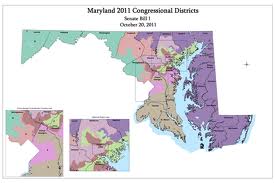 Being a member of Congress is as good as it gets in the Maryland Republican Party. I believe Andy Harris will hold this seat for a very long time. However, you never know . . . so maybe this seat will one day be vacant. Here’s who I think might be in the mix:
Being a member of Congress is as good as it gets in the Maryland Republican Party. I believe Andy Harris will hold this seat for a very long time. However, you never know . . . so maybe this seat will one day be vacant. Here’s who I think might be in the mix:
Ocean City Mayor Rick Meehan–While a well-known and popular figure on the Lower Shore, Rick has the disadvantage of never having run for anything except for municipal office. Municipal elections in Maryland tend to be low key, low budget affairs. I’m also not confident in his fundraising potential. However, the Salisbury media market is so cheap that even half a million might be enough to wage a real campaign.
Delegate Mike McDermott–Currently challenging Jim Mathias for the District 38 State Senate seat, I’ve heard him discussed as a potential primary challenger to Andy Harris. I’m sure he’d run in an open seat situation. With more fights under his belt after this cycle than most Maryland pols, he could raise at least 500k (which is a competitive sum in this type of Republican primary).
Before he resigned, I’d have rated self funding multimillionaire State Senator EJ Pipkin as the man to beat. But he’s moved to Texas to get a Master’s in Sports Management. Then there was District 37 Senator Richard Colburn (who had challenged then Congressman Wayne Gilchrist in a past election), but he was defeated in the primary by Delegate Addie Eckhart (who now represents 1/5th of the district) and would be wise to take a shot at this seat if she wants to move up further before moving out.
The most dynamic potential candidate by far is soon to be former Delegate Jeanne Haddaway-Riccio, Harford County Executive David Craig’s running mate in his failed gubernatorial bid. The very smart, photogenic former Minority Whip might very well be the choice of national Republicans and could raise $1 million dollars (a substantial sum in this rural district).
Former Bush Administration official Mary Beth Corrrazzo (who I think will cruise to victory in her Lower Shore subdistrict against former Teacher Judy Davis) would be another incredibly dynamic candidate. I believe she could raise up to $2 million, a crushingly large sum here. She would be an even likelier choice for national Republicans.
Former Harford County Executive David Craig would be a strong candidate. A little dull and more moderate than the Republican Primary electorate, but still a very strong candidate from the suburban Baltimore piece of the district.
On the Democratic side, the bench here is weak and we normally end up with sacrificial lamb candidates given the district’s current configuration. Former Congressman Frank Kratovil might be enticed to run in an open seat but would he really give up a judgeship for what is at best a dicey proposition? The former representative would, however, turn this into a hotly watched race. Kratovil raised just over $2 million dollars in 2010 and I expect he could hit that mark once again.
Former Republian Congressman Wayne Gilchrist is far too liberal (he endorsed Heather Mizeur, the Delegate from the Democratic People’s Republic of Takoma Park, for Governor in the Democratic Primary for Governor) to win a GOP Primary. He’d be welcomed with open arms by the DCCC and could raise the $1.6 million it takes on average to win a congressional seat.
The dominant rumor in the state for the last few weeks has been that soon to be former Montgomery County Delegate Heather Mizeur intends to challenge Andy Harris from her organic farm in Kent County. This is too ridiculous for my tastes. I think she could raise $1.25 million (what she raised for Governor pre-match). I also think she’d lose by twenty points.
District 38 State Senator Jim Mathias would be a stronger candidate with deeper roots in the district and if the DCCC got involved (which I think they would), could raise well over $1 million dollars. But any Democrat would find it very tough to win this heavily Republican turf.




